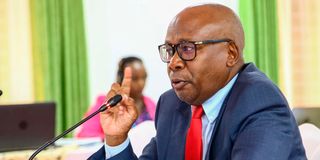Abolish Woman Rep seat and cut number of MPs, advises ex-AG Githu Muigai

Former Attorney General Githu Muigai before the committee at the Bomas of Kenya on September 28, 2023.
Former Attorney General Githu Muigai has proposed that the current 290 constituencies and 47 counties be reduced to a maximum of 100 and 14 respectively.
Appearing before the National Dialogue Committee, Prof Muigai said the country was overrepresented.
He also proposed the scrapping of the Woman Representative seat.
Currently, there are 47 Woman Representatives in Parliament, one from each county.
A proposal to increase the number of counties from the current 47 to 56 to address perceived marginalisation is currently before the dialogue team.
In his proposal, the former government legal advisor said his proposed 100 constituencies would elect one man and one woman to the National Assembly.
200 members
This would mean that the House would have a total of 200 members.
Currently, the House has 349 members --290 elected from constituencies, 47 Woman Reps and 12 nominated members.
"We have too many people in Parliament, we have too many constituencies and counties. They cost us a lot of money. Reduce the constituencies to about 100 and have one man and one woman in each," Prof Muigai told the team.
He said the Bomas draft initially proposed 14 counties, but the number was increased.
He said the counties were not viable because of resource constraints.
"Bring more counties together and let them work together and mobilise and share resources together," he explained.
He also opposed the push to audit the presidential results, describing it as a futile exercise since the Supreme Court had already ruled on the elections.
Appointing electoral commissioners
Prof Muigai is also opposed to the Inter-Party Parliamentary Group (IPPG) system of appointing electoral commissioners. He described the 1997 case as a mitigated disaster.
IPPG was a system adopted ahead of the 1997 general election whereby political parties directly selected commissioners for then Electoral Commission of Kenya which has since morphed into the Independent Electoral and Boundaries Commission (IEBC). This proposal has proved divisive in the past.
National Assembly Minority Leader Opiyo Wandayi said the system produced one of the most credible elections in 2002.





